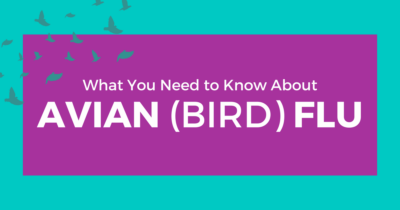
What You Need to Know About Avian Flu

There has been a lot of news circulating about avian flu (also known as bird flu) and its impact. But just how serious is this? Does it impact only animals, or are humans at risk as well? Could it be the next pandemic? Here’s what you need to know about avian flu.
Since January 2022, the U.S. has faced the biggest outbreak yet of bird flu. According to the CDC, avian flu is caused when a bird (or human) is infected with avian influenza Type A virus. These viruses naturally spread among wild aquatic birds worldwide and can infect domestic poultry and other bird and animal species. While bird flu viruses rarely infect humans, it has occurred.
Impact on Birds and Humans
The CDC’s website lists wild aquatic birds in two categories:
- Waterbirds: Ducks, Geese, Swans, Gulls and Terns
- Shorebirds: Storks, Plovers, and Sandpipers
Wild aquatic birds are considered hosts for avian influenza A viruses. They can be infected with avian flu in their intestines and respiratory tract, but some species, like ducks, may not get sick. Usually, though, avian influenza A viruses are very contagious among birds, and some of these viruses can sicken and even kill certain domesticated bird species, including chickens, ducks, and turkeys. If a virus outbreak happens, depopulation occurs and nearby flocks are monitored and quarantined. They will also be depopulated if the disease is detected.
Since the outbreak started, more than 6,900 wild birds have been detected with the virus, and over 58 million domestic birds have been affected. Thankfully, there has only been one human case. The CDC says there are vaccine trials underway that could be used to protect humans in case the virus changes and becomes more of a threat.
If a human does get infected with bird flu, it’s usually because they came into unprotected contact (no gloves, protective wear, etc.) with infected birds. The CDC has a great resource about what to do if you are exposed, symptoms to be aware of, and what to do if you become infected with bird flu.
Wildlife agencies regularly investigate sick and dead birds if there are a lot occurring in one area. If you see a dead bird, you are encouraged report it. This can help with early detection of bird flu and West Nile virus as well. Check with your state health department, state veterinary diagnostic laboratory or state wildlife agency for more information on how to report this in your area.
How Safe is Food Supply?
According to the CDC, the U.S. poultry industry has strict health and safety standards, including regular monitoring for bird flu. You might be wondering if it is safe to eat properly handled and cooked poultry in the United States. Proper handling and cooking poultry and eggs (to an internal temperature of 165˚F) kills bacteria and viruses, including bird flu viruses.
Bird flu is unlikely to be the next pandemic. Although this is the worst outbreak in history, the USDA said improved biosecurity measures have vastly reduced the number of cases in the commercial sector. For example, in early 2022, there were 51 detections among commercial poultry; by March 2023, there were only seven.
As a general precaution, people should avoid direct contact with wild birds and observe them only from a distance. The chances of getting the “regular” flu are still greater than avian flu, so the best thing you can do is get your annual flu vaccine.


